By Harold C. Ford
“We can’t arrest our way out of this problem…but…every day I come to work, a citizen of this community is on my phone complaining about crime in their area where they live …What’s the answer for that citizen?” …Terence Green, chief of police, Flint Police Department
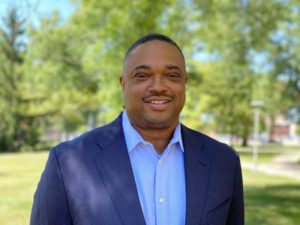
Flint Chief of Police, Terence Green. (Photo source: City of Flint website)
“We will continue to see environmental injustices…in the Flints of this world.” …Pamela Pugh, vice president, Michigan Board of Education, commenting on Flint water crisis settlement
Two area forums—Flint Area Public Affairs Forum (FAPAF) and Tendaji Talk(s)—offer Flint-area citizens and other interested persons a regular schedule of panel discussions that feature relevant topics and knowledgeable panelists. In recent months, panels have tackled tough topics permeated by race.

Photo source: FAPAF Facebook page
In 1903, W. E B. Du Bois wrote in The Souls of Black Folk that “the problem of the Twentieth Century is the problem of color line.” The 20th century “problem” referenced by Du Bois yet bedevils us in this 21st century. Locally, FAPAF forums and Tendaji Talks have unflinchingly tackled “color line” issues head on in addition to other public matters of significant import.
The Oct 27, 2020 FAPAF forum tackled policing and race relations. The April 13, 2021 Tendaji Talk examined race in the context of public health and the Flint water crisis settlement.
“Racial Justice & Public Safety: Defunding, Defending, and the Future of Policing”
The Oct. 27, 2020 FAPAF forum featured:
- Debra Furr-Holden, associate dean for public health integration, Michigan State University (MSU); director, Flint Center for Healthy Equity Solutions, MSU
- DeWaun Robinson: community activist; president, Black Lives Matter-Flint
- Terence Greene: chief of police, Flint Police Department
- Scott Wolfe: associate professor of criminal justice, MSU
‘I think my dad would be disheartened to see the state of affairs and how the police interact with the communities they’re charged to protect and serve,” said Furr-Holden about her late father, a career police officer, at the beginning of a lively forum. “He’d also be disappointed to see the supports, resources that are available for police officers in this day and time.”
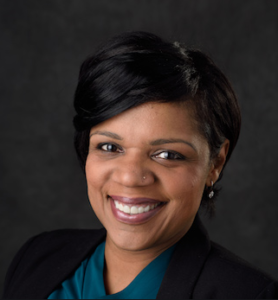
Dr. Debra Furr-Holden, associate dean for public health integration, Michigan State University (MSU); director, Flint Center for Healthy Equity Solutions, MSU. (Photo source: Michigan State University website)
“What we know when we look at the national data, often times police officers,” continued Furr-Holden, “the lion’s share of the things they’re called for are social services …your average police officer is not trained in those areas.”
“We’re trained to recognize mental illness and deal with mental illness,” countered Greene, chief of the Mt. Morris Township Police Department before coming to Flint. “We have policies and procedures to deal with people’s suffering …It’s not all about putting handcuffs on people, arresting people.”
Robinson envisioned many crisis situations benefitting more from a dispatch of social workers to the scene rather than police officers. “I am in full support of defunding police departments and in favor of allocating those dollars toward social services,” he said. “I’m very big on preventive measures.”
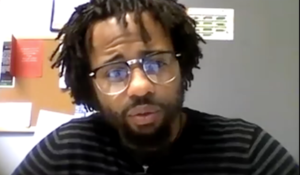
DeWaun Robinson: community activist; president, Black Lives Matter-Flint. (Photo source: FAPAF zoom video session.)
“When people talk about defunding, the funding is already gone,” Greene said, “there is no funding.”
“We’re not talking about a whole amount,” Robinson cautioned, “but a certain percentage of it that can go toward social services.”
Guided by research, Wolfe cautioned against defunding that overreaches: “Hasty, ill-conceived, poorly planned defunding decisions will lead to very bad, long-term consequences for communities that need the most help …crime and victimization will increase immediately.”
“We shouldn’t be necessarily looking to take money away from police agencies,” continued Wolfe, “during a time when one of the main problems that we see in a lot of these controversial use-of-force incidents stems from a lack of training.”
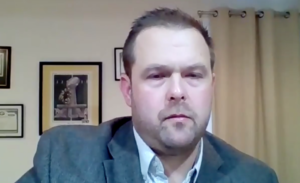
Scott Wolfe: associate professor of criminal justice, MSU. (Photo source: FAPAF zoom video session.)
Wolfe divided the topic of police training into four categories: implicit bias training; crisis intervention training; de-escalation training; and procedural justice training. Of the four, he said procedural justice training “probably shows the most promise.”
Though divided on some of the issues, panelists’ comments found heartfelt areas of commonality.
Furr-Holden said of her father: “He didn’t have a police car, he walked the beat …He knew everybody in the district, in the community he served.”
“The reason I got into law enforcement is because I wanted to make a difference in the community that I live in,” added Greene. “The goal isn’t to come to work, arrest people, put them in jail, take away their freedom.”
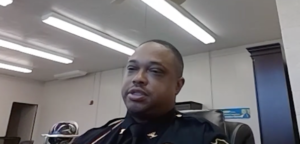
Flint Chief of Police, Terrence Green. (Photo source: FAPAF zoom video session.)
‘That (defunding) doesn’t mean abolish police because there are some good police officers in the neighborhoods,” admitted Robinson.
“This is the type of conversations people all over the country need to be having,” concluded Wolfe.
“This is a good conversation,” agreed Robinson. “Everyone is bringing some gold to the table.”
“Racism is a Public Health Issue, Part 2”
The April 13 Tendaji Talk focused on the $640 million+ Flint water crisis settlement announced in January 2021. The deadline to register to opt-in to the settlement was March 29.
Tendaji Talk panelists included:
- Pamela Pugh: vice president, Michigan Board of Education
- Debra Furr-Holden: epidemiologist, associate dean for public health integration, C. S. Mott endowed professor of public health, MSU

Flint Water Plant on Dort Hwy. in the north end of Flint. (Photo by Tom Travis)
The deadline to register to opt-in to the settlement was March 29. East Village Magazine’s Tom Travis described the terms of participating in the water crisis settlement in a Jan. 30 post:
Travis added additional detail about the requirements for filing a claim in an April 26 online post:
“We haven’t addressed the issue of (prosecutorial) justice,” Furr-Holden implored at the start of the forum. “How do you put a price on the experiences of stress and trauma, of being lied to, of being misled?”
“It just feels like being retraumatized,” Furr-Holden added. “It is justice delayed …and it is justice denied.”
Earlier this year, prosecutions against eight local and state officials including former Michigan Governor Rick Snyder were announced by the Michigan attorney general’s office.
“When we look at the corrective injustice (in terms of yet-to-be-resolved civil and criminal cases) we do know that we fall short,” Pugh observed.

Pamela Pugh: vice president, Michigan Board of Education (Photo source: Pamela Pugh)
Furr-Holden did not sound optimistic about Flint victims achieving a full measure of justice: “The people who hold power and privilege in our society are majority white and majority male …Somehow we have an acceptance and a tolerance for racial injustice.”
“We deserve equitable and swift justice,” Pugh said.
Attendee and Flint resident Lee Bell issued a warning to the nation about Flint’s experience: “Flint is just the face of a tragedy coming to another community real soon.”
* * * * * *
March 2, 2021 FAPAF: “Vaccines, What to Know, Whom to Trust”
Panelists included:
- Mona Hanna Attisha: Flint pediatrician; chair, Protect Michigan Commission
- Bobby Mukkumala: physician and chair of Asian Working Group, Protect Michigan Commission
- Lawrence Reynolds: pediatrician, public health officer, City of Flint
- Dondre Young: Americorps program officer, Michigan Community Service Commission, Department of Health & Human Services
A recording of this discussion can be accessed on Zoom.
* * * * * *
Next Tendaji Talk: “Woman to Woman Community Dialogue”; 4-6 p.m. April 29, 2021.
The panel will include women dedicated to youth, families, and the Greater Flint community. The Zoom conversation is sponsored by Michigan State University, Flint Registry, and Hurley Children’s Hospital, Pediatric Health Initiative. Phone 517-4332 6200 or visit the following site: https://bit.ly/WomanToWoman0429. Contact Kenyetta Dotson at 810-600-9182. You can register for the Zoom session at this link.
* * * * * *
Note: Previous Tendaji talks can be accessed at the following MSU website: https://msu.zoom.us/j/95817209600; passcode is 138079. Or you can contact Donna Ulrich at the following email address for an electronic link; dullrich@umich.edu.
EVM reporter, Harold Ford, can be reached at hcford1185@gmail.com.


You must be logged in to post a comment.